Physicians, scientists, and staff from the Department of Ophthalmology at the University of Pittsburgh School of Medicine, Children’s Hospital of Pittsburgh of UPMC, and the Western Pennsylvania School for Blind Children (WPSBC) are working together to help find a solution for Cortical Visual Impairment (CVI). CVI is the leading visual diagnosis among children, affecting nearly […]
A Beam of Light to the Brain Can Help to See in the Future
Included below is a translated segment by Kalevi Rantanen published in Helsingin Sanomat, the largest subscription newspaper in Finland, on February 20, 2020. In the future, the blind can see light when video is sent directly to the brain. Eyes, and even the optic nerve, can be bypassed by optogenetics, where images are produced by […]
Read More… from A Beam of Light to the Brain Can Help to See in the Future
Why Cancer Patients Need Individualized Treatments
“While the goals seem lofty, they are within reach.” —Dr. Uma Duvvuri Advancements in personalized medicine are changing the way scientists and clinicians are studying and treating cancer, particularly of the head and neck variety, at the University of Pittsburgh School of Medicine. Personalized medicine is broadly defined as an approach to medicine in which […]
Read More… from Why Cancer Patients Need Individualized Treatments
Regenerating the Optic Nerve
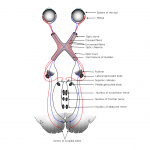
Dr. Taka Kuwajima, whose team focuses on optic nerve regeneration and mechanisms that lead to nerve cell death in a variety of ocular diseases has recently identified novel molecular pathways that affect nerve cell death at early and late stages of axon degeneration. Visual information is conveyed from the eye to the brain via the […]
Using Virtual Reality for Balance Disorders
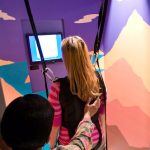
Balance disorders are a common problem with potentially debilitating effects. Because many different conditions can cause a balance disorder, in order to prescribe the best treatment, physicians must first determine the cause. An accurate diagnosis will allow the best treatment to be determined. The Center for Balance Disorders within the Department of Otolaryngology has a […]
First in the U.S. to Implant Wireless Retinal Device
The University of Pittsburgh Medical Center has implanted the first patient in the United States with a new wireless retinal device as part of a clinical trial aimed at restoring partial sight to patients with advanced age-related macular degeneration (AMD), a disease that leads to permanent blindness. “Vision research has advanced dramatically in the recent […]
Read More… from First in the U.S. to Implant Wireless Retinal Device
The Challenge of Voice Patients in Transitioning to Conversational Speech
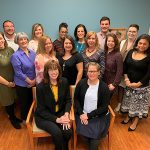
Whether you are saying hello to a friend, answering a question at school or work, or simply talking to your neighbor, your voice is what often connects you to the people and world around you. Clinicians and scientists in the Department of Otolaryngology at the University of Pittsburgh School of Medicine continue to study voice […]
Read More… from The Challenge of Voice Patients in Transitioning to Conversational Speech
Remembering Jim Funderburgh

It is with great sadness that we inform you of the passing of Jim Funderburgh, Professor of Ophthalmology at the University of Ophthalmology. Jim passed away on November 27, 2019 after a four-year battle with pancreatic cancer. He died quietly at home surrounded by his family. His obituary is available to read online. “This is […]
Using Our Own Bacteria to Treat Eye Disorders
While some people associate the word ‘bacteria’ with disease or infection, Anthony St. Leger, PhD is seeing it in a different light: as a means to better eye treatment. Dr. St. Leger and his team have been investigating how the eye microbiome, a collection of microbes such as fungi, bacteria, and viruses, work together with […]
Read More… from Using Our Own Bacteria to Treat Eye Disorders
How Tissue Banks May Help Prevent Allergic Reactions

Sino-Nasal disorders remain a key area of the research taking place in the Department of Otolaryngology at the University of Pittsburgh School of Medicine. Under the direction of Stella Lee, MD, researchers and clinicians continue to study the complex, yet very common sino-nasal disorders that affect so many of us on a daily basis. “One […]
Read More… from How Tissue Banks May Help Prevent Allergic Reactions
Engineers, Researchers, and Physicians Team Up to Advance Surgery in Pittsburgh
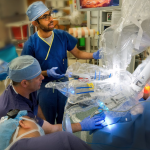
Founded three years ago by the Department of Otolaryngology at the University of Pittsburgh, Pittsburgh CREATES (Collaborative Research, Education, And Technology Enhancement in Surgery) is a state of- the-art Surgical Education and Surgical Innovation center housed on the first floor of Eye and Ear Institute. CREATES was founded with guiding principle that for patients to […]
Read More… from Engineers, Researchers, and Physicians Team Up to Advance Surgery in Pittsburgh
Turning Back the Clock on Macular Degeneration
Age-Related Macular Degeneration (AMD) is the leading cause of irreversible vision loss in the United States, affecting nearly two million people, according to the American Academy of Ophthalmology. With the aging population in America, this number is estimated to double in the coming two decades. AMD is a disease in the eye that affects the […]
Read More… from Turning Back the Clock on Macular Degeneration
Hearing Loss and Your Greater Health
Consistently ranked among the best programs in the country, the Department of Audiology at the University of Pittsburgh School of Medicine continues to work towards solving the puzzle of hearing loss. The number of people affected by hearing loss is staggering, with nearly 50 million people here in the United States and roughly 466 million […]
The Future of Glaucoma Treatment
Researchers in the Department of Ophthalmology at the University of Pittsburgh School of Medicine continue to make strides in the treatment of glaucoma. Glaucoma is a condition that damages the optic nerve, the vital nerve that transfers visual information from the retina to the vision centers in the brain. This loss of optic nerve tissue, […]
Developing a Cure for Tinnitus
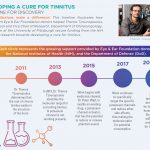
The Eye & Ear Foundation collects support from donors like you to help propel research forward. Whether big or small, our donors’ gifts make a difference in the lives of patients and their families. One of our favorite stories that exemplifies the impact of continuous support in a given area of research is the story […]